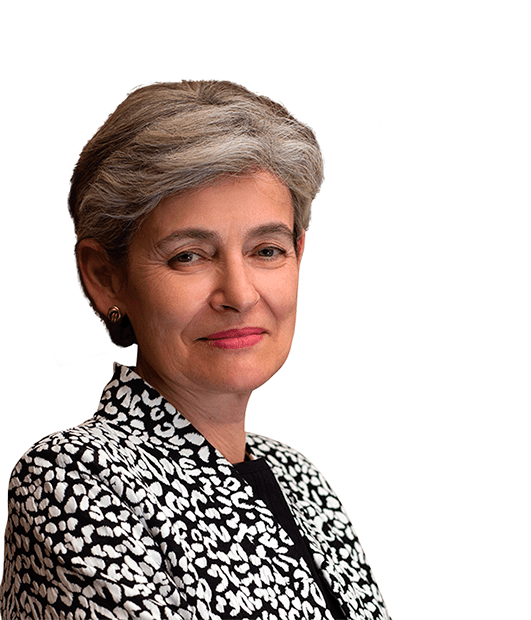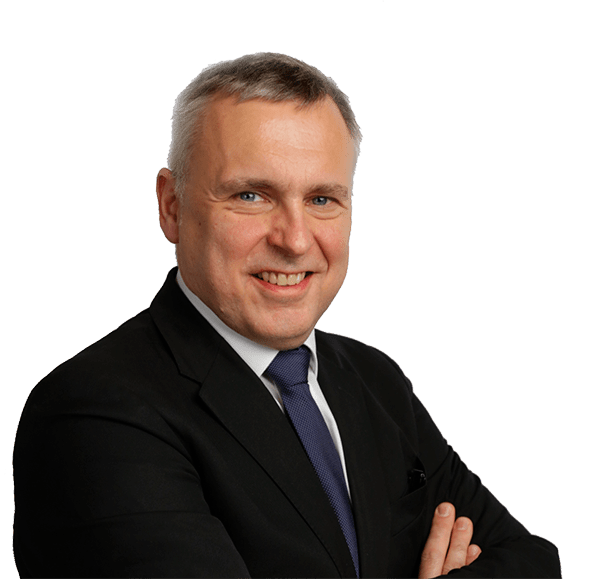Board committees
The committees of the Board of Directors are advisory and consultative bodies made of the current Board members with relevant experience and expertise in committees’ specific focus areas.
The committees can also involve external experts and consultants in their work. The committees’ key role is to preview the key issues reserved for the Company’s Board of Directors.
The committees are responsible for ensuring that issues brought before the Board have been subject to sufficient review in order to ensure that the directors are able to cast their votes based on the full and accurate information. To achieve this, committee members maintain a regular dialogue with the management, the Company’s external auditor and other advisors on the issues that fall within their remit.

independent director, Chairman of the Remuneration and Human Resources Committee
Having been reshuffled before the very end of 2018, the Committee expanded its remit in 2019. In addition to our customary responsibilities (assessment of professional skills, independence and engagement of prospective and existing members of the Board of Directors, evaluation of staff motivation programmes, best practice guidance and analysis for performance appraisal of the Board of Directors and N to N-2 managers), we drew our focus toward more comprehensive staff training as well as employee loyalty and engagement assessment. It goes without saying that businesses operating in the era of digitalisation and artificial intelligence are faced with new standards for staff training. HR priorities are now shifting from skills training to creating a development-focused environment. It is clear that employee development programmes must expand and evolve to keep up with modern times. Without doubt, every company should prioritise employee satisfaction. That is why the Company’s 2025 Strategy sets out two targets which fall within the scope of our Committee: the number of training hours and the creation of an integrated employee loyalty index. Both when initially assessing nominations to the bi-annual Board of Directors and subsequently when finalising its composition, our Committee decides which reasons should disqualify members from serving on it.
The introduction of external independent directors (Xavier Rolet from CQS Management Ltd., Sven Ombudstvedt from Norske Skog, Jim Rogers from Beeland Interests Inc. (among others), A. Sharonov from Moscow School of Management SKOLKOVO, N. Pashkevich from St Petersburg Mining University) did not affect the members’ performance of their duties as directors in the reporting year, and actually allowed for the greatest possible contribution of these experts to the Company’s growth.
In 2020, we intend to do our best to successfully address these challenges.

independent director, Chairman of the Audit Committee
The Committee’s remit includes:
- reviewing the IFRS financials for integrity and transparency;
- analysis of financial reporting processes, including carrying out regular reviews and making recommendations for the Board of Directors;
- recommending the Company’s external auditor to the Board of Directors and maintaining an ongoing relationship with the external auditor;
- providing support to the Internal Audit function and analysing the quarterly results of their work;
- ensuring compliance with applicable legislation and relevant standards of business conduct.
According to the Regulations on the Company’s Audit Committee, the Audit Committee shall consist of no fewer than three current members of the Board of Directors and shall be chaired by an independent director. Since 2018, the Committee has included four independent directors.
In 2019, the Committee focused on:
- Reviewing IFRS consolidated financial statements for integrity and transparency, as well as analysing the Company’s financial performance, including reasons for changes when compared with the results of previous periods and approved budgets.
- Analysing the Group’s financial reporting processes. In 2019, the Group completed technically challenging projects, including the roll-out of a new consolidation system based on Oracle Hyperion Financial Management. This was integrated with three accounting systems (Oracle E-Business Suite, SAP B1 and 1C) used by consolidated companies of various jurisdictions, profiles and sizes. With the successful completion of these projects, the Group managed to reduce the time required to prepare its annual accounts (the Board of Directors meeting regarding 2019 results was held on 20 February 2020) by a month.
- Recommending the Company’s external auditors to the Board of Directors and maintaining an ongoing relationship with them. When choosing an auditor, we take into account the following factors in addition to its fees. First, the team of auditors shall possess the relevant personal qualifications and be suitably experienced to ensure the audit is performed in due time and to the highest of standards.
Second, we assess the auditor’s independence based on a number of factors including the scope of the non-audit services rendered by the auditor. Any KPMG proposal for rendering a non-audit service is subject to an internal review by KPMG. If the audit leader confirms that there is no threat to auditor independence, the proposal is forwarded to the Company’s Audit Committee for review and approval. The Committee only agrees to engage the auditor if the scope of the non-audit services is not so substantial as to challenge the objectivity and independence of the auditor. When assessing the auditor’s independence, the Committee also looks at whether the auditor has internal procedures in place to control the objectivity and professional ethics of its staff. This includes the requirement for the routine rotation of the audit leader, the auditor’s training in this area, and the use of specialised software to carry out relevant reviews.
Third, we strive to maintain a balance between the benefits of long-term cooperation and the need for a fresh perspective on the Company’s accounts and the report preparation processes.
Finally, when assessing the possibility of continuing cooperation with the external auditor, the Committee assesses the auditor’s performance from the previous period. The Committee draws on its face-to-face meetings, which are attended by the audit manager and the audit leader, when assessing the performance of the external auditor. There are 4 to 5 of such meetings every year. In addition, each meeting is preceded by a meeting of the audit team and the Audit Committee Chair, which focuses, amongst other things, on the quality of interaction with the Company employees responsible for providing data for the audit.
- Supporting the internal audit function, approving annual action plans for the Internal Audit Department, and monitoring its performance on a quarterly basis. The Committee reviews risk-based audit plans and submits them for approval by the Board of Directors. It should be noted that all core business processes will be audited given the results achieved by the Internal Audit Department in 2019 and its plans for 2020.
- Providing control over the Company’s compliance with legal and regulatory requirements, business ethics and customs. In particular, the Committee reviewed an external analysis of the Company’s internal control and audit functions in 2019. In addition, the Committee performed reviews of the Company’s compliance with the Russian Central Bank Corporate Governance Code, as well as with UK Corporate governance code. Both reviews were positive.
Importantly, we also focus on ensuring the required quality and completeness of information disclosure. To ensure this, we

independent director, Chair of the Sustainable Development Committee
In May 2019, PhosAgro’s Board of Directors set up a Sustainable Development Committee to ensure that in doing its business the Company adheres to the highest standards of accountability, integrity and transparency. We also aim to help the Company maintain a balanced strategic approach to ESG reporting and activities. At its two meetings in 2019, the Committee approved the list of the UN Sustainable Development Goals and the relevant targets along with the Company’s initiatives to pursue them, the respective timelines and budgets. Under the Committee’s supervision, the Company introduced a number of metrics and relevant measurable targets to 2025 linked to management KPIs. The Committee steered the Company activities to promote the global sustainable development agenda in 2019. Specifically, as a sponsor and partner of the International Year of the Periodic Table, PhosAgro actively contributed to the events held under its auspices. In May 2019, we launched the Regional Soil Laboratory Network (RESOLAN) for Africa (AFRILAB) development project, in November, the Company joined the European Sustainable Phosphorus Platform (ESPP), and in December 2019, the Group became the founding member of the Green Club, an independent association of producers and suppliers of eco-friendly products. We are pleased to note that our efforts have been recognised internationally. In September, the UN named PhosAgro as a Global Compact LEAD company for its commitment to corporate social responsibility and sustainable development, in November, the Company was awarded the Gold Medal as Industry Stewardship Champion by the IFA (International Fertilizer Association), in December, we became the winner in two categories at the 2019 Awards for Russian Leaders in Corporate Philanthropy Advancing Sustainable Development, organised by the Russian Donors Forum, PwC and the Vedomosti newspaper.
In 2020, we will continue our efforts to strengthen the Company’s sustainability framework by integrating the UN Sustainable Development Goals and the relevant targets into its strategy and day-to-day operations. Going forward, the Committee’s area of responsibility will include PhosAgro’s numerous educational and charitable projects, both domestic and international, cooperation with global organisations, as well as supervision and monitoring of approved social and environmental initiatives.

independent director, Chairman of the Risk Management Committee, Chairman of the Strategy Committee
Xavier Rolet’s association with the Company helped its risk management activities to gain traction. In 2019, the Committee moved beyond general risk assessment and monitoring to scrutinise specific risks and perform an in-depth analysis. The Committee held four meetings in 2019 focusing on:
- Results of monitoring the management of key corporate risks (quarterly).
- Results of a reassessment of the Company’s key risks and updating its risk map for 2019.
- Evaluation of the Company’s risk management and internal control system.
- Management of key specific corporate risks (new or critical). These include cybersecurity and sustainable development risks.
I note with satisfaction that the Company’s risk management and internal control system was highly appraised following an external assessment in 2019. We intend to keep this positive momentum going into 2020.

independent director, Chairman of the Risk Management Committee, Chairman of the Strategy Committee
From late 2018 through early 2019, the Committee, in cooperation with the Company’s management, was actively developing our 2025 Strategy. For the first time ever, we mapped our strategic goals against inherent risks and the UN Sustainable Development Goals. Our efforts were rewarded in March 2019 when the Board of Directors approved and adopted the document. The Board of Directors also established targets and procedures to monitor performance vs. the approved Strategy, which falls within the remit of our Committee. On top of that, the Committee held two meetings where it reviewed the progress made towards meeting Strategy 2020 goals, analysed actual performance vs. 2016 targets and recommended that the Board of Directors declare Strategy 2020 goals as achieved. The Committee also reviewed a progress report covering priority areas of the Company’s business in 2018 and approved such priorities for 2019.

member of the Management Board, Chairman of the Environmental, Health and Safety Committee
The reporting year saw Natalia Pashkevich, First Vice Rector at St Petersburg Mining University and a world-renowned researcher, join our Committee. This helped us gain a fresh perspective on matters falling within the Committee’s remit, and come forward with new solutions. Traditionally, the Committee oversees three major workstreams:
- health and safety;
- environmental protection;
- energy efficiency.
As regards health and safety, the reporting year proved to be distressing for both the Committee and the Company in general since PhosAgro’s production sites recorded several accidents. This required immediate action from the management, which resulted in Apatit’s strategic health and safety programme for 2019–2021 reviewed and recommended by the Committee for approval as early as in the mid-year. The programme comprises a wide range of improvements in this domain. Greatly concerned over this matter, the Board of Directors has made it one of its priorities. As part of their commitment to improve the situation, the directors now start every meeting with a review of a health and safety report and progress on the relevant initiatives. In 2019, the Committee expanded the scope of its duties to review the effectiveness of programmes run by the Group’s companies to reduce pollutant emissions, discharges and waste generation. At the same time, we continued to monitor industrial emissions (effluents) for meeting the standards aligned with the best available practices.
We also remained focused on regulatory compliance, reviewing, among others, draft laws, which are yet to be considered and approved. In the reporting year, due in no small part to our recommendations, the Company’s sites launched energy reliability programmes. The coming year will see the Company, for the first time in its history, generate energy from renewable sources.